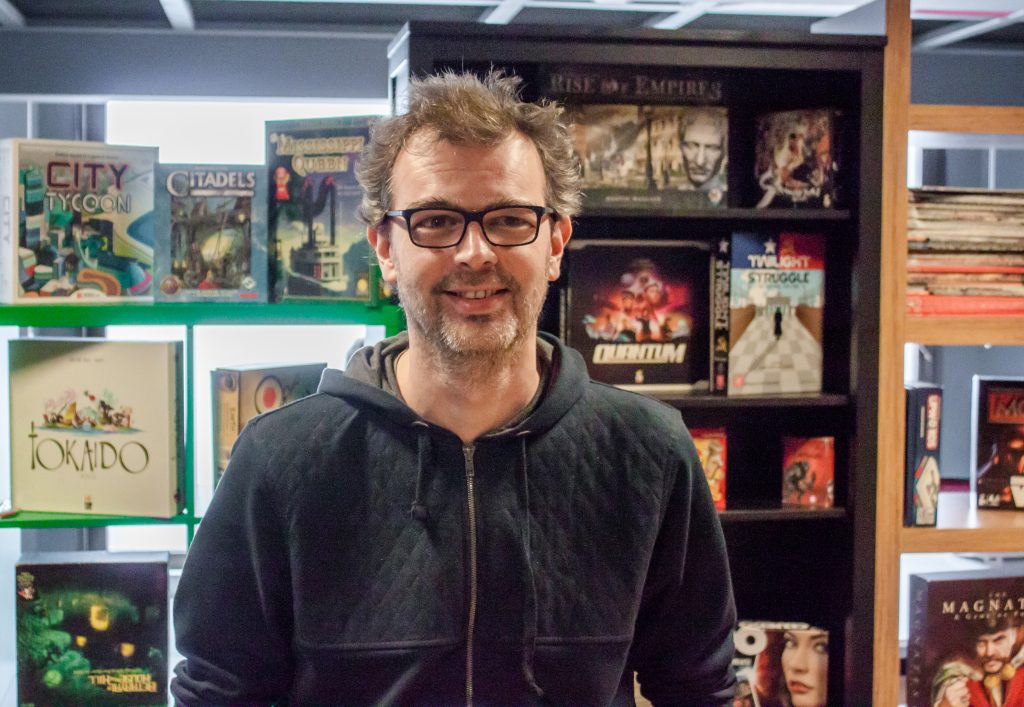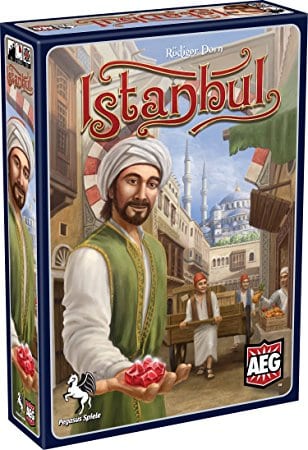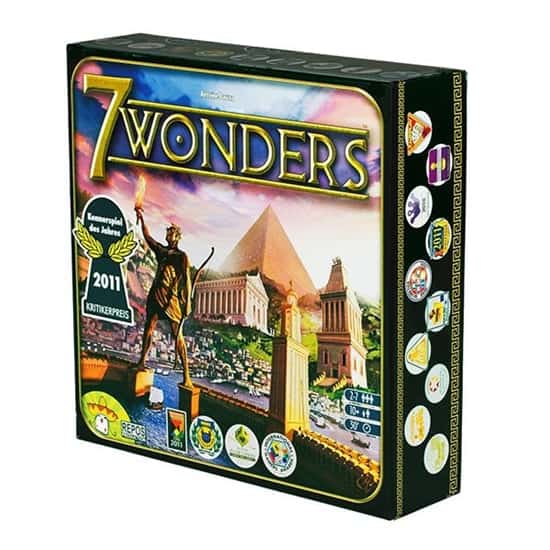If there’s one physical thing that travelers seek to bring or find along the journey, aside from books, it is board games. Even more than books, board games ground us in a sense of home. They are social games and when our old social connections are missing, they help us build new ones in a familiar way.
Board games long had a reputation of being nerdy, but recent years have seen a sustained renaissance in the medium that is (fortunately) only tangentially related to the weird and inauthentic commercialization of nerd culture that has taken place during roughly the same time. The current golden age of board gaming has been driven by design innovation, with a diversity of form and game-play that Boggles the mind (pun intended). But like the historical renaissance, it hasn’t taken place equally everywhere. Turkey has until much more recently been a bit of a barren landscape for gaming, despite a strong culture of family entertainment. Part of that is because most popular games are imports, such as Monopoly, and are popular because they are old and famous rather than being truly fun. Games like Monopoly harken back to a more antiquated age of gaming and are more likely to be bought and placed prominently on a shelf rather than actively played for enjoyment.
But inevitably, great gaming has found its way to Turkey, as have talented designers. Rising to meet a growing hunger for quality board gaming are talented local designers and games that are built from the ground up with Turkish motifs and values.

Yabangee recently sat down with Murat Çelebi, a French game designer with Turkish roots who is part of the growing board game culture in Istanbul. He works out of Bahçeşehir University’s gaming (BUG) lab in Karaköy and is writing a new chapter in what has been a life-long story of game creation.
What was the first board game that you remember playing? What do you remember about it?
If the question is about tabletop games, then I think it is “Mille Bornes”, a French card game from 1954 made by Dujardin editions, where you’re a car driver trying to reach 1000 kilometers exactly. The game includes a lot of “take that” moments and is essentially based on luck, but has a few options to manage your hand and optimize your play. I never really enjoyed that game, but that was what I had to play with when I was living at my grandma’s until the age of 7.
If the question is about board games that include an actual board, then it’s a mix of games that a friend of mine owned and that we often played: Risk, Monopoly, The Game of Life, and some less famous ones like “Long Cours“, “Richesses du Monde“, “Auteuil“, and the genius “Stop Thief” (at that time it was pretty genius – I’m talking about the very early 80s).
But these games didn’t really hold my attention for very long. I remember we essentially spent time modifying the rules and customizing the games, integrating them into another one. For example, we played The Game of Life as if each turn was like a single day in a week. In that game day, we would go to Monopoly and Long Cours during week days, Horse Race during the weekend, etc… My real passion for board games started with International Team and their relatively accessible wargames.
When did you decide you were going to design games?
Well, I don’t really know. I designed my first game with a friend back when I was 10. We each had a military base and factories to produce new units; we would go rescue some innocent citizens and grab some money from a central island until we were strong enough to go destroy the other player. That was a two-player game. Then I designed various abstract games with another friend when I was a teenager, but maybe I can say that I became a professional game designer when I founded Rackham with two other people in 1997 and we released a miniature game called “Confrontation“. I can say that it was a combination of factors that made me game designer more than any particular intent or active decision on my part.
What was your path to Turkey? What brought you here and what keeps you here?
My father is Turkish and I first lived in Turkey for a year when I was two years old, but of course I don’t remember anything except for my grandpa’s car, an old sand-colored “Anadol“, and the taste of my grandma’s sour cherry compote. I’ve lived mainly in France, with one year in the US in 2009, but I would go to Turkey for holidays almost every summer. Turkey was, for me, the country of sun, beaches, and ice cream. Not so bad.
In 2012, my wife’s uncle, who produces wine in Tekirdağ, wanted to open a winehouse. We were living in Lille at that time and my wife, Pelin, was depressed and sad. We both missed the sun. I perfectly remember my son, who was two years old at that time, asking me, “Daddy, why is the sky blue today?” I tried to explain that blue was the sky’s natural color, not gray. So, we ended up taking the job of caring for the family winery. I continued my game design job for a year remotely, two weeks here in Turkey followed by two weeks in France, but it was hell. Pelin took good care of the winery and I started to help more there too, abandoning game design for a little while. Then we moved to Istanbul, where we live now, mainly so that my son could attend a French school and for me to get back in touch with game design.
At this point, nothing really keeps me here besides the fact that we are settled here, but I would move to the US again if an opportunity occurs. Pelin lived most of her life in the US and became a citizen. I don’t really want to go back in France, except if it is in Toulouse, the “Pink City”.
You grew up in another country and came to Turkey to live later in life. That is true for most expats, but you are also ethnically Turkish. What are some experiences you think are unique to your situation?
Since I was coming every summer to Turkey for holiday, I learned Turkish on the beach. We never really spoke Turkish at home. My father is Turkish, but my mother is French, and my father really wanted to integrate into French society. He put a lot of work into the language and no French people can actually guess that he is Turkish or even a foreigner; he has no accent and looks more like a typical Norwegian than a typical Turk. So, I inherited some aspects of Turkish culture, but most of my knowledge before moving here was related to leisure. My vocabulary was good enough to deal with situations you encounter on holiday, but that was about it.
So when we moved to Turkey, it took me a while to realize that I wasn’t here for holidays. It was actually like a two-year long shock. I had to learn words that are used in professional environments and to adapt to real daily life. Before, I always knew that any annoying thing that I had to deal with in Turkey was just temporary because I’d be going back home to France when the holiday was over. I was mentally used to that, and it was hard to reconfigure my brain to “Now you’re here, you’re not on holiday, you’re not leaving soon”.
You have a young child. What has he taught you about games? Do you find yourself playing different games now that you have a son, not just when you play with him but on your own time too?
Since I’ve been in Turkey, I find myself playing video games much more because for a long time I didn’t find many people to play board games with. My son, Yunus, was three when we moved to Turkey and he gave me the opportunity to stay in touch with board games, even if it was simple ones. Because of my passion for tabletop games, he likes them too and as he got older we could move on toward more complex and interesting games. Now he’s 7 and I can play almost any game in my collection with him. What he’s taught me is to just let it go sometimes. In competitive games where there is a single winner at the end of the game, you have to go for victory or the game makes no sense. But it is not so important to just win or lose. I tried to teach that to Yunus, but I actually realized that I was maybe too attached to winning.
So, I learned to take a few steps back in gaming, and he has too. I thank him for that. It led us to playing cooperative games, where the players are playing together against the game, meaning that they either win together or lose together. I’m trying to play more cooperative games now, or at least semi-cooperative ones where the players either lose together or win, but at the end, there is a “MVP” sort of thing. I would love to design a semi-cooperative game one day.
How would you describe board gaming in Turkey compared to France or the United States?
Well, the market is definitely growing. Some Turkish publishers translate foreign games to Turkish because there is a demand, and people in Turkey are more and more interested in board games. Some of those publishers even make their own creations, original games, which is definitely proof that the future of board game in Turkey is bright. Because of the mobile games culture, people in Turkey prefer games that aren’t so long, which is a global trend, but because Turkey’s real exposure to the board gaming world coincided with the explosion of mobile games, they look for really short games, which limits the range of playable games. For now at least; because once people begin to enjoy board games, they’re usually ready to play longer ones.
In France, people are looking more for different types of experiences, different core gameplays, while in the US they’re looking for more complexity, challenge, and elaborated graphics. French people will seek more interaction and focus on the tricks you can do in games, while Americans look for more awesomeness and prefer when there are characters. Turkish players want accessibility and immediacy, because board game culture is still not widely spread.
What are some of your recent projects that you’ve worked on? What kinds of projects excite you?
I recently worked on a rather simple trophy collection hunting game, with just cards, dice and a few markers. In that game, days and nights alternate (it’s a memorial hunt that last for three days) and affect the game-play. I also worked on a cooperative game for UNICEF, part of the social cohesion program between Turkish and Syrian teenagers. I worked on a pattern recognition game using ceramic tiles from the Seljuk period that you try to arrange in specific motifs on the table, as if you were decorating a wall or a floor. I also made a pirate game based on the historical conflicts of early 16th century in the Mediterranean Sea, where players sail in the wake of Barbaros (Hayrettin Paşa), the famous pirate that ended his career as admiral of the Ottoman fleet.
I’m actually working now on a cult game (that hopefully will become a cult game) where players “incarnate” some dark Gods. They will bring destruction and apocalypse to a world and, in order to do so, they need worshippers to believe in them and perform the various ceremonies and rituals that give power to players. I’m working with a couple local people on that, a Turkish artist and American producer, as well as an old colleague from France. It’s good to work with people who are really interested in gaming because there is so much that goes into balancing a game once you have settled on the core concept and mechanics. Sometimes the game you’re working on isn’t fun because something just isn’t working but you have to keep playing to find ways to improve it.
What more can you tell us about this cult project and why it appeals to you?
I actually started that project 3 years ago with my friend Matthieu, but back then it was set in a mafia universe. We started from the concept of pyramidal structure of a secret organization. We made many versions of that game, and realized that in fact, it would work better in a dark fantasy, almost Lovecraftian universe. So we switched to a cultic universe. After another few versions, we reached a point where we were stuck with a game that was very interesting but so hard to read and with a lot of incoherences regarding the universe. So we set it aside for a long time.
Just a few months ago, I met with a couple of guys at Bahçeşehir, Berkan and Michael, about working on some board game projects. I showed them all the projects I had in stock, old ones, very old ones, crazy ones, stupid ones, and some more modern and realistically doable ones, and they ultimately liked this one the most. We’re calling it “Master of the Cult” for now, but we might need to change that name one day.
The game was really going in a good direction, playtests were constructive, but then I don’t really know what happened but the sauce became too thick and the game went wrong. We’re actually rethinking the game entirely, keeping the pyramidal structure as a base, but making players less vulnerable to luck and shortening and simplifying it drastically. We had aimed for a 60-90 minutes game and it end up being closer to almost 180 minutes. Now that I know more precisely what not to do with it, we all need to move our asses a bit to get the project moving again.
What are three games you would recommend to an expat fresh off the boat to pass their time in Turkey in style and maybe even learn a few Turkish words?
Well, I will give you a list of games that are in Turkish language and that you can find easily in Turkey:
– Jungle Speed, a reflex and agility game, where you have to spot similar shapes and colors to grab a wooden totem in the center of the table. Each player receives cards at the beginning of the game and has to try to get rid of them by being faster than other players. Don’t play it with young kids before bedtime or with girls that have really long nails.
– Settlers of Catan, because if there is one game that can satisfy the most casual gamer and the deepest hard-core player at the same time, this would be that game. You have to colonize a wild Island, gather resources to develop your cities, and trade with other players, which is actually the best part of the game.
– And “Tavla” of course! That’s the Turkish national sport! Perfect to socialize and learn some Turkish expressions, you can find Tavla pretty much everywhere in Turkey. Beware though; the point system is slightly different than the classic, like the doubling cube not used here.
What are your three favorite games about or set in Turkey?
– “Istanbul” definitely! It’s a little bit thicker a game than the ones in the previous list, but the universe is early renaissance and the material is very nice; German-style but still pretty good. And Istanbul, well… it’s in Turkey. You play a merchant and go visit various places like the Sultan’s palace, a tea house, the post office, a prison to bribe the guards and set you family members free… But most importantly, you don’t work yourself. Like any good Turkish merchant, your assistants are going to all the jobs. And if you have no more assistant available, go to the fountain and wait for them to return, so you can give them new orders. It’s so Turkish.

– “Tigris and Euphrate”, which is an even thicker game but it’s technically set in Turkey too. You have to develop the Hittite civilization between the two rivers, build temples, and farm the land, but also wage war. It’s one of my favorite games of all times because it has a very original tile placement system and a genius victory point count system: you score victory points in 4 different colors, and at the end of the game, only your lowest score counts. So you have to diversify somehow, and are torn between the temptation to abuse of your strong color and to try to make your weakest color grow. You need at least 2 hours to play, but it’s really worth the try.
– “7 Wonders” occurs in ancient times too, but with different civilizations trying to shine scientifically, architecturally, economically, philosophically and of course the military to mess it all up. This game is really wonderful (pun intended), based on the drafting system of “Magic the Gathering”. It’s accessible to almost everyone and is almost infinitely replayable. So, if you are into the 7 ancient wonders, several of which are used to be in Turkey, then this is the one tabletop game you want.

I really want to recommend Boardgamegeek.com for anyone who is interested in board games and wants to explore further. It’s is an excellent website that references in detail a lot of games. It’s very useful to find games that could correspond to any gamer’s criteria. Boardgamearena.com is another good resource. It’s a web platform where you can play about 100 different board games online for free, from very simple ones to very complex ones.
Finally, I have a couple of stereotypical questions to ask a French Turk. Who has better cheese, France or Turkey? Who has better wine, France or Turkey?
Cheese? Are you kidding me? France, of course. But, I have to admit that some Turkish cheeses are perfect for their use, like “Beyaz Peynir” for Turkish breakfast and börek could not be replaced by anything. If you haven’t tried it, definitely try it with parsley, walnut, all ground together, heavily sprinkled on plain pasta and olive oil. I also do like the “Kars Gravyer” when it’s properly made and roasted “Hellim Peyniri” is just delicious. But it is not as varied as in France, you can’t have those fruity “Comte”, the wooden “Mont d’Or”, that fantastic liquid cheese called “Cancoyote” or a little goaty “Crottin de Chavignol” on a bed of “Frisee” greens.. Oh I miss that…
Wine? Well that’s different. Of course, centuries of wine making in France can’t be caught up to by any Turkish wine maker, at least not for another few centuries. But, the progress made by Turkish people on the subject of wine is properly amazing. Now you can have some real good Turkish wine, for a price that’s not too exaggerated. They have really learned. Pelin’s uncle’s “Sauvignon Blanc”, for example, is close in terms of quality to a good ”Chablis” or ”Gevurtz-Straminer”. They don’t taste the same, but it gives me the same level of pleasure. On the other hand, it is hard to find low to medium quality wine at a reasonable price because of the taxation system. So the wine culture won’t spread widely in Turkish culture. But if you want to find a good wine and are ready to put a little money on it, now you can with Turkish wine. Whatever wine they were making 20-30 years ago was mostly crap, but that time is definitely over.
Product images intended as fair use. All photos courtesy of Michael Barngrover.









